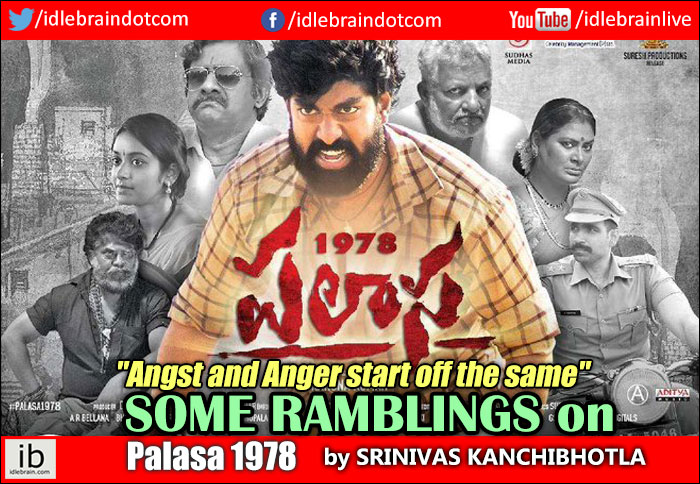
The dates may vary but the script remains the same, the perpetrators may be different, but the victims remain the same. In just the state of (united) Andhra Pradesh alone, two massacres, separated by a decade, came to define the state of the downtrodden and marginalized sections of the society even after forty years of independence. Karamchedu in 1985 and Chundur in 1991, two incidents, marked by casteist hegemony and oppressive establishment, have truly shown the place of Dalits in the then progressive times, as one far removed from the rest of the society - socially, economically, politically and culturally. Though there were other incidents, smaller and minor (meaning, the killings didn't rise to the level to being bestowed with a 'massacre' title) in prior and subsequent periods all the way chalking up to the current times, Karamchedu and Chundur remain etched in annals of Dalit history no less in impact and significance than a Jalian Wallah Bagh for its grotesque savagery and establishment's entitlement. Both the incidents started off as run of the mill tiffs that remain a regular fixture in rural India - Upper caste youths washing their wares at the water holes reserved for Dalits in one case, a Dalit man's feet accidentally grazing an Upper caste lady in a movie theater in the second one. That such incidents could incite pogroms the levels of which never seen before in village politics, with the upper caste youths, at the behest of their caste elders, cordoning off the Dalit's living areas hacking away the conscientious objectors and outraging the modesty of their women, all to show them their place by stripping off their basic dignity as fellow human beings and reducing them to a level below it, is a constant reminder that if Gandhiji's saying that India lives in its villages is indeed true then independence or not, the same divide and rule at the hands of Indians remains to be just as dangerous as in hands of the British when it comes to the matters of oppression.
Dalit milieu has never been treated as commercially viable in telugu cinema, unless the setting happens to be in the way of an upper caste hero, like finding himself in there trying to bring about some reformation. Even then the focus was on the (upper caste) hero's realization of hitherto unkown facet of the society that remained purposefully hidden from the rest of the civilized world. There was nary a voice from the dalit-wada nor was there a dalit-wallah to give a first hand account of what it feels to belong to a marginalized section, to conduct themselves in a subservient manner to the elders of the village, to have their homes and communities far flung from the main streets, to have their motives questioned, to have their moves watched over, to essentially be a second rate citizen in their own country. And to top it, the burning issue of cross-caste love affairs and marriages, where the parents would rather their kids be dead than be caught in a relationship with a dalit man, and to really rub it in, term it an "honor" killing as though the people from the other side of the street are steeped in dishonor and disrepute and the only kind of washing away the shame is through blood, the effect that all these can have on a person's psyche while growing up in the segregated quarters taught, trained and instilled to always remain guarded, both of the intentions of upper castes and the instincts of their own - this voice was never the voice of the protagonist in the mainstream. Accessories to someone else's realization, yes, accomplices in someone else's road to redemption, yes, but a protagonist in his own personal journey, never....until now... until 'Palasa 1978'
'Palasa 1978' is not a polished product, in fact, it appears to be constantly shifting focus, unsure most times of which point it wants to emphasize, and caught trying to say too many things at the same time. But that is all beside the point. 'Palasa' is an important film, only because someone chose to depict a side, voice a viewpoint that is rarely (well, never) seen on the telugu screen. While the rest of industries - tamil, malayalam, kannada, and even marathi (in its latest 'Sairat') - have taken rapid strides in bringing to fore the stories of the oppressed, telugu has remained obstinately oblivious to the lives of this section, often glossing it over with pie in the sky solutions. This section is not looking for any solution or waiting for a redemption, in fact, they are quite comfortable in their own skin and in their own manner. All that they are looking for is a place at the table from where they could narrate their own experiences of what it means to grow up a dalit to a society that is in a self-congratulatory and chest-thumping mode for providing the incentives and reservations to bring them on par with the rest (voiced in an excellent speech in the climax by the SI character). Whether 70 years of reservations have indeed changed the fates of majority of the dalit community remains to be answered, the fact that there is an opposition already to those incentives from a section of the majority claiming that economic status alone should be the criterion for them, goes on to show how little the majority understand about the dalit experience, that a section of people remains at the fringes of the mainstream not because they don't have enough but because they are not deemed enough. The strength of 'Palasa 1978' doesn't lie in its execution, but in its intention. Three Cheers!
checkout http://kanchib.blogspot.com for Srinivas's Blog.
